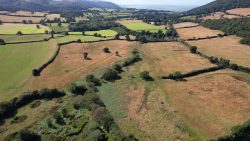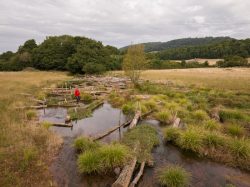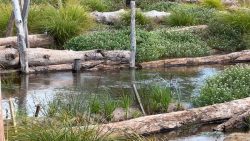 THE National Trust’s Holnicote estate on Exmoor was one of three finalists for this year’s UK River Prize awards, which are organised by the River Restoration Centre. The Trust’s pioneering project adopted an innovative American “Stage Zero” technique to restore a section of the River Aller creating new wetlands to benefit both people and wildlife. It is the first time this method has been used for river restoration in the UK.
THE National Trust’s Holnicote estate on Exmoor was one of three finalists for this year’s UK River Prize awards, which are organised by the River Restoration Centre. The Trust’s pioneering project adopted an innovative American “Stage Zero” technique to restore a section of the River Aller creating new wetlands to benefit both people and wildlife. It is the first time this method has been used for river restoration in the UK.
This ambitious project, aimed at restoring natural processes and ecological function in the River Aller and Horner Water catchments won the Catchment Restoration Award in the annual River Prizes. The runners up were the Eddleston Water Project, led by Tweed Forum, and the Howgill Beck Naturalisation Project, led by the RSPB.
 For centuries, the rivers in this area of Somerset have been simplified and straightened, disconnecting them from the surrounding landscapes, providing little resilience against flooding or in times of drought.
For centuries, the rivers in this area of Somerset have been simplified and straightened, disconnecting them from the surrounding landscapes, providing little resilience against flooding or in times of drought.
Since 2018, the Riverlands team at the 12,500-acre Holnicote estate have been delivering pioneering and innovative approaches to both river restoration and land management, by taking a catchment-based, landscape-scale approach. This has resulted in the area being both resilient in times of flood and drought, while also being rich in nature, while remaining agriculturally productive.
 Ben Eardley, the Trust’s project manager, says: “We’re absolutely delighted to receive this national recognition for our work in restoring the health and resilience of the Horner and Aller catchments. Early results have been very promising – flood peak reductions of up to 40 per cent, longer lag times and decreased turbidity are just a few of the indicators showing the project’s impact.
Ben Eardley, the Trust’s project manager, says: “We’re absolutely delighted to receive this national recognition for our work in restoring the health and resilience of the Horner and Aller catchments. Early results have been very promising – flood peak reductions of up to 40 per cent, longer lag times and decreased turbidity are just a few of the indicators showing the project’s impact.
“This prize wouldn’t have been possible without the strong collaboration of our partners, the dedication of local farmers, and the ongoing support from the community.”
Stewart Clarke, the Trust’s national freshwater specialist, says: “Drawing inspiration from successful  projects in Oregon, the National Trust has been at the forefront of experimenting with the Stage Zero technique at Holnicote. This innovative approach is not just a groundbreaking step for river restoration in Europe, but also an exciting opportunity to learn more about how we can harness the natural processes that our rivers once relied on.
projects in Oregon, the National Trust has been at the forefront of experimenting with the Stage Zero technique at Holnicote. This innovative approach is not just a groundbreaking step for river restoration in Europe, but also an exciting opportunity to learn more about how we can harness the natural processes that our rivers once relied on.
“Stage Zero offers huge promise for river systems rich in nature that can store water, sediment and carbon and we can create such wetland reaches within the network of more familiar single channel rivers where space allows.”
 Similar work has also been undertaken across 125 hectares of Tivington Farm upstream of the River Aller Stage Zero scheme. Several kilometres of ditches were restored, and the farm was also reverted back to pasture from recent arable practice to reduce the impact of land management on the water environment.
Similar work has also been undertaken across 125 hectares of Tivington Farm upstream of the River Aller Stage Zero scheme. Several kilometres of ditches were restored, and the farm was also reverted back to pasture from recent arable practice to reduce the impact of land management on the water environment.
The team at Holnicote will now continue its restoration efforts, ensuring a more climate-resilient and biodiverse landscape. Plans include the development of a landscape recovery scheme to offer fair compensation for land managers who prioritise habitat and wildlife conservation.
 To find out more about the Riverlands project: https://www.nationaltrust.org.uk/appeal/porlock-vale-riverlands-appeal.
To find out more about the Riverlands project: https://www.nationaltrust.org.uk/appeal/porlock-vale-riverlands-appeal.
Pictured: An aerial view of the Holnicote Estate site in August 2024; photograph © View It 360
One year on from the creation of the new wetlands, nature is thriving; photograph © View It 360
Inspecting part of the newly created wetlands; photograph by James Beck © National Trust
A peacock butterfly at Holnicote; photograph by Hugh Mothersole © National Trust
Barn owl; photograph by Ian Ward © National Trust
Water vole; photograph by Richard Brtadshaw © National Trust